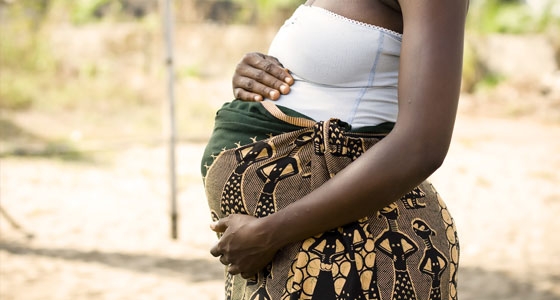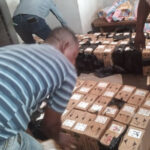Teenage Pregnancy: Public Health Emergency
- Home
- Teenage Pregnancy: Public Health Emergency

Teenage Pregnancy: Public Health Emergency
 In the Agbogbloshie market in Accra stood Nafissa with a big head pan tucked under her arm, shabbily dressed and a three-month old baby strapped with a cloth to her back. Nafissa, like several others, is looking for load to carry so that she and Lariba, her baby, can buy some porridge for breakfast.
In the Agbogbloshie market in Accra stood Nafissa with a big head pan tucked under her arm, shabbily dressed and a three-month old baby strapped with a cloth to her back. Nafissa, like several others, is looking for load to carry so that she and Lariba, her baby, can buy some porridge for breakfast.
She enthusiastically carried my load of two bunches of plantain, small bags of beans, maize, gari and two baskets of tomatoes I had bought to store at home in this time of social distancing.
The sight of ‘kayayei’ in markets is not uncommon at all. In fact, society has unconsciously accepted them as part of our market culture. Nafissa told me that her job as head porter, commonly known as ‘kayayoo’, had become less lucrative.
The coronavirus had discouraged many from coming to the market as shops and stalls, which usually bustled with activity, were closed. Nafissa and her friends were being starved of loads, on which their very survival depended.
She led the way as we made our way to drop off my wares in the car, tilting her head in a particular way and walking in a particular rhythm, which swayed her baby left to right and portrayed a job she was so used to.
Shopping trolleys
As I followed, I wondered if Nafissa would have a job if we provided trolleys in the markets like it is done in other countries. I asked myself how, as a nation, we look on as critical human resources, which need to be nurtured for the development of the country, are only deployed as shopping trolleys!
But the root cause of the problem is our unhelpful attitude towards planning our families and the lack of effective attention in reducing the teenage pregnancy rate, which now stands at 14 per cent.
As the Executive Director of the National Population Council, Dr Letitia Adelaide Appiah, explains, “This is due to the country’s ineffective management of population growth.”
“We are not building a population with a focus on resilience, equitable growth and inclusiveness to prevent needless suffering,” she says.
She wonders why our laws do not allow children aged 13, for example, to drive, but would look on for same to have children. Children having children, who they definitely cannot cater properly for or nurture to become productive, is part of the social and economic problems that the country faces.
Some of such children end up like Nafissa, who has to resort to being used as a trolley, continuing that vicious cycle by having children she cannot properly nurture.
Anything short of this and we will continue to grow in numbers with no quality of life and we will continue to suffer the socio-economic consequences.
The life of the teenage mother is put at risk because her body is not well developed to give birth. She is also predisposed to developing some conditions, including an obstetric fistula (an abnormal connection between the rectum and the vagina which could be caused by injury during childbirth, among others).
The babies these child mothers give birth to, according to scientific studies, are more likely to be pre-term babies, small for their age and unhealthy.
For such children, caesarian delivery is advised, but how many of them can afford such services?
Child mothers
Dr Appiah argues that “child marriage creates childhood poverty, which creates adulthood poverty, which does not create resilient individuals and communities, badly needed in this knowledge era”.
The consequences of children having children they cannot properly nurture include their inability to give them good education, good nutrition, good health care, needed clothing and proper shelter, with a number of them condemned to a life on our streets. The effect of such on crime has been well documented.
If we want relief from our health burden, we cannot overlook the contribution teenage pregnancy makes to the situation. Dr Appiah recommends a trade-off; we should completely reduce child marriage or teen parenthood for the resilient building of our girls and our human capital.
This, she knows, will also improve our economic capital accumulation necessary for national resilience. There is the need to pursue a planned and sustained effort to control our population by changing our unhelpful attitude of valuing having children without caring about how they will be nurtured.
Mechanisms needed
There should be mechanisms, laws and regulations that are strictly enforced to discourage people from having children they cannot or do not intend to take care of. There must be intensive education for people to know that it is expensive to take care of children and that certain standards are required in doing so, and that a person’s success should be measured by how useful and responsible they have nurtured their children to become, rather than having children to top up the numbers.
It doesn’t take much to have children, even monkeys and lizards do. The difference humans make is how they take care of their offspring. If they are not capable of doing so, then they have no business producing children.
Thankfully, effective measures that prevent unwanted conception abound. Anything short of this and we will continue to grow in numbers with no quality of life and we will continue to suffer the socio-economic consequences.
Source: Graphic Online
- Share
Classic Ghana
Classic Ghana brings you into a fun world of arts, entertainment, fashion, beauty, photography, culture and all things in between. Let’s explore these together!







